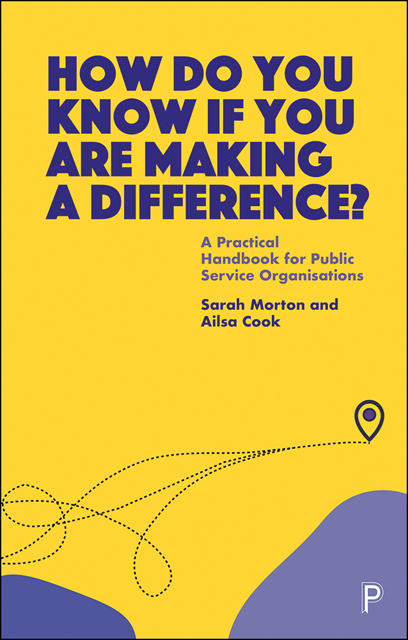 How Do You Know If You Are Making a Difference?
How Do You Know If You Are Making a Difference? Book contents
- Frontmatter
- Dedication
- Contents
- List of figures and tables
- Acknowledgements
- Preface
- 1 Why is it so hard to know if you are making a difference?
- 2 Why complexity thinking can help you understand public services
- 3 What data and evidence do you need to see what difference you are making?
- 4 Embrace the complex contex
- 5 Embrace the complex context
- 6 Clarify the change you want to see
- 7 Get going on your data, evidence and feedback improvement journey
- 8 Tracking progress towards outcomes and impacts
- 9 Telling the story of the difference your work makes
- 10 Using this approach in different contexts and sectors
- 11 Becoming an outcome- and impact-focused organisation
- References
- Index
2 - Why complexity thinking can help you understand public services
Published online by Cambridge University Press: 20 June 2023
- Frontmatter
- Dedication
- Contents
- List of figures and tables
- Acknowledgements
- Preface
- 1 Why is it so hard to know if you are making a difference?
- 2 Why complexity thinking can help you understand public services
- 3 What data and evidence do you need to see what difference you are making?
- 4 Embrace the complex contex
- 5 Embrace the complex context
- 6 Clarify the change you want to see
- 7 Get going on your data, evidence and feedback improvement journey
- 8 Tracking progress towards outcomes and impacts
- 9 Telling the story of the difference your work makes
- 10 Using this approach in different contexts and sectors
- 11 Becoming an outcome- and impact-focused organisation
- References
- Index
Summary
You are probably reading this book because you care about making things better for people or communities – through providing services, improvement projects and programmes, policy influencing, systems change or practice influencing. What is interesting and what these have in common is that they are not simple change mechanisms – they sit in complex webs of services, programmes, policies and practices, and are not under the control of any one organisation. Instead, change happens through a web of interlinked, overlapping approaches and services.
For initiatives that want to understand the change they make – and make the best change possible – they need to engage with this complexity, with thinking, approaches and tools that embrace and suit the world in which they operate. But working in a way that is compatible with this complexity can be challenging and doesn’t always sit well with current ways of doing things.
In this chapter we dig into some of the main issues we have seen people grappling with when trying to do this difficult work.
This chapter considers:
• a shift in thinking for complexity-informed approaches;
• working with complex systems;
• people at the heart of complex change;
• evaluating in complexity;
• how our approach helps to work with complexity.
We hope in this chapter you will find familiar ideas and new ones, and it will help orientate your thinking to the challenges of delivering, developing and influencing public services in the 21st century. We want you to feel informed about the importance of complexity for delivering people-based work and have ammunition to argue for complexity-informed ways of monitoring and evaluating for your own change programmes.
A shift in thinking for complexity-informed approaches
Around the world, governments and organisations (for example, the Australian Government, 2019; The Manchester Partnership, 2021) are bringing new thinking to understand the problems that public services are tackling.
The way this is expressed across settings has differences and nuances, but this shift in thinking usually includes the following:
• A recognition that people’s problems are complex and messy with lots of interdependencies that are unlikely to be solved with single initiatives and programmes.
• An understanding that people are best placed to know what they need and what action to take, and that building on an asset-based model rather than a deficit one is more productive and empowering.
- Type
- Chapter
- Information
- How Do You Know If You Are Making a Difference?A Practical Handbook for Public Service Organisations, pp. 13 - 29Publisher: Bristol University PressPrint publication year: 2022
